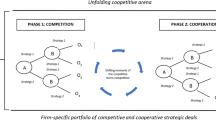Abstract
In the nonlinear environment, co-opetition strategy has become the main approach for modern enterprise to gain competitive advantages. Based on the analysis of new tendency of the enterprise strategy’s evolvement from antagonism to co-opetition, then the reason why co-opetition strategy occur and exist widely with the use of correlative theory is given, at last the influence of co-opetition on the traditional strategy pattern is described. The study shows that, taking the co-opetition strategy has great significance of enterprises for a profound longterm development.
Access this chapter
Tax calculation will be finalised at checkout
Purchases are for personal use only
Similar content being viewed by others
References
Brown SL, Eisenhardt CM (2001) Edge competition. Mechanical Industry Press, Beijing
Dan-an Xue (2011) “Co-oetition” theory review. Word Chongqing 28(3):54–56 (Chinese)
Dunning JH (1997) Alliance capitalism and global business. Routledge, London/New York, pp 1–5
Dyer JH, Singh H (1998) Academy of management. Acad Manag Rev 23(4/otc):660–665
Dyer JH, Kale P, Singh H (2001) How to make strategic alliances work. MIT Sloan Manag Rev 42(4):37–43
Hines P (1998) Value stream management. Int J Logist Manag 9(1):25–42
Hui-hong Liu, Jie-ya Yu, Ming-de Qi, Zhong-chun Mi (2005) Co-opetitive game and its solution. Forecasting 24(2):73–75 (Chinese)
Jian-feng Luo (2012) Literature review of enterprise co-opetition theory. Account Financ 136(2):69 (Chinese)
Leiblein MJ (2003) The choice of organizational governance form and performance: predictions from transaction cost, resource-based, and real options theories. J Manag 29(6):937–961
Nalebuff BJ, Brandenbuger AM (1996) Co-opetition. Harper Colins Publishers, New York
Porter ME (1998) Competitive advantage: creating and sustaining superior performance. Free Press, New York, p 6
Qiang-shen An, Shou-feng Zhang (2006) Flexible corporate strategy of co-opetition. Stat Decis 22(12):155–157 (Chinese)
Rayport JF, Sviokla JJ (1995) Exploiting the virtual value chain. Harv Bus Rev 73(9–12):75–99
Wei-guo Zhang, Xue-mei Qinf (2012) Mechanism of stability and choice of Chinese enterprises. Ind Econ 221(7):35 (Chinese)
Williamson OE (1985) The economic institutions of capitalism. The Free Press, New York
Williamson OE (1996) The mechanisms of governance. Oxford University Press, New York
Yi-fei Du, Shi-ming Li (2004) Industrial value chain: the innovative format of value strategy. Stud Sci Sci 22(5):552–556 (Chinese)
Author information
Authors and Affiliations
Corresponding author
Editor information
Editors and Affiliations
Rights and permissions
Copyright information
© 2013 Springer-Verlag Berlin Heidelberg
About this paper
Cite this paper
Li, Zh., Zhao, Mr. (2013). Study of “Co-opetition” Strategy in Nonlinear Environment. In: Qi, E., Shen, J., Dou, R. (eds) Proceedings of 20th International Conference on Industrial Engineering and Engineering Management. Springer, Berlin, Heidelberg. https://doi.org/10.1007/978-3-642-40072-8_113
Download citation
DOI: https://doi.org/10.1007/978-3-642-40072-8_113
Published:
Publisher Name: Springer, Berlin, Heidelberg
Print ISBN: 978-3-642-40071-1
Online ISBN: 978-3-642-40072-8
eBook Packages: Business and EconomicsBusiness and Management (R0)




